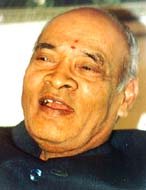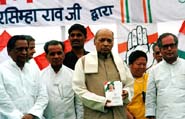'The charges are baseless and I knew I had nothing to worry about'
 It is easier to extract blood from a stone than it is to get P V Narasimha
Rao to be forthcoming on the record. The first interview he gave
Sunday -- in 1991 shortly after taking over -- become an almost
comic affair in which he refused to answer at any length any question
which could be at all controversial.
It is easier to extract blood from a stone than it is to get P V Narasimha
Rao to be forthcoming on the record. The first interview he gave
Sunday -- in 1991 shortly after taking over -- become an almost
comic affair in which he refused to answer at any length any question
which could be at all controversial.
Later, he stopped giving interviews to anybody and left it to
his media managers to destroy his image. In recent months, he
has begun talking to the press but always comes across as uncommunicative
and distant; as a man who is being forced to confess at gunpoint.
Negotiations for this interview began six weeks ago. We were clear
that we did not want the usual Narasimha Rao interview in which
the interviewer fired questions while the subject ducked. And
yet it is hard for a man to change his basic nature at the age
of 75.
Finally, we agreed on a compromise that was not entirely satisfactory
but did at least guarantee that we would get some answers out of
a former prime minister whose reticence put even Morarji Desai
to shame.
Sunday editor Vir Sanghvi met Rao for two long off-the-record conversations
at the end of which Rao agreed to answer a questionnaire which
went over the ground that had been covered in their chats.
Narasimha Rao was clear that he would only give his replies in
writing. "Every time I say anything, people seize on it for
all kinds of meanings so I am uncomfortable with talking. At least
this way, I can think about the answers and phrase them carefully,"
he explained. From our perspective of course, what is meant was
this: No supplementaries would be possible.
He sent us two replies to a long questionnaire. He sent one set
of answers over, thought about it again and then decided he wanted
to do another set of replies. For the most part, it is vintage
Rao: articulate on issues of policy but closed in on any controversial
matter. And of course, the famous reticence remains when it comes
to any personal questions. But events overtook the interview
as Sunday was going to press.
Rao was perturbed enough by the interview with Jayalalitha to want to categorically deny her claim
that the Congress-AIADMK alliance had been negotiated by his
astrologer, Raghavendra Rao. He phoned Sanghvi and agreed to answer
two questions on the subject.
Then, just as we were about to print, Narasimha Rao suddenly stepped
down. The interview risked being incomplete without some explanation
of the sudden decision. There was no time now for questionnaires
and written answers.
On the morning of Tuesday, 24 September, while Sitaram Kesri's
supporters celebrated his accession as Rao's successor, Sanghvi
and Rao spoke again about the resignation.
These responses appear at the beginning of the interview, lead
in to the conversation about astrology and then, the written replies
take over. We have kept questions that may now seem out of date
(about a working president, for instance) because they provide
an insight into Rao's state of mind just four days before he resigned.
Readers may find that the real Narasimha Rao comes across more
in the spoken par of the interview than in the written responses.
But then, that is Narasimha Rao: Always preferring to be cautious
than to be forthcoming.
Why did you resign as Congress president?
 Ever since the electoral defeat there have been murmurings -- in some cases, very loud murmurings -- about a change in leadership.
Ever since the electoral defeat there have been murmurings -- in some cases, very loud murmurings -- about a change in leadership.
There is nothing new about this. It happens every time when there
is a defeat. And it is to be expected of a big organisation like
the Congress where people often have their own motivation because
nothing moves in the Congress without motivation.
This had been going on and I was prepared to face it when this
court case was dragged out of the archives. I believe that the
charges are baseless and I knew that I had nothing to worry about
on that score. But after one full round in the courts, I was beginning
to feel embarrassed.
Embarrassed in what way?
There seemed to be, on the part of the courts, a reluctance
to do away with the complaint without going through the trial
stage.
Our position was that there was no material to base even the issuance
of summons on. But though they did not specifically say this,
we got the feeling that the court wanted us to go through the
trial stage to prove this. They were suggesting that if we believed
that the case was baseless, then we should go to court to prove
it.
We spent two months arguing our case and when it looked as though
we would have to go through another round of this, I felt awkward
about doing this as Congress president.
|





 It is easier to extract blood from a stone than it is to get P V Narasimha
Rao to be forthcoming on the record. The first interview he gave
Sunday -- in 1991 shortly after taking over -- become an almost
comic affair in which he refused to answer at any length any question
which could be at all controversial.
It is easier to extract blood from a stone than it is to get P V Narasimha
Rao to be forthcoming on the record. The first interview he gave
Sunday -- in 1991 shortly after taking over -- become an almost
comic affair in which he refused to answer at any length any question
which could be at all controversial.
 Ever since the electoral defeat there have been murmurings -- in some cases, very loud murmurings -- about a change in leadership.
Ever since the electoral defeat there have been murmurings -- in some cases, very loud murmurings -- about a change in leadership.